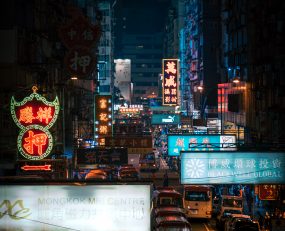
Hong Kong has witnessed 14 consecutive weeks of protests sparked by a bill, that if enacted, would have allowed the extradition of criminal suspects to mainland China. This bill was seen as a move by China to further rescind Hong Kong’s judicial independence. The protests began on March 31, where at least 130,000 people marched against the bill. Not all demonstrations have been violent, but the disruption caused has been substantial.
The 14 weeks’ worth of demonstrations has caused obstructions to logistics operations in and around the city as well as further afield.
In the hope of gaining the world’s attention, protesters took to targeting Hong Kong International Airport, blockading roads as well as vandalising public amenities and areas.
The violent outbursts in the airport terminals on August 13, led the first closure at Hong Kong International Airport with hundreds of flights being cancelled and planes being grounded for two days. According to EPS News, statistically a day’s worth of interruption could have caused a loss of freight volume of 13,863 tonnes and a loss of air cargo valued at CNY10.2bn (€1.3bn). Luckily contingency plans were implemented, and the influence wasn’t as significant as anticipated. However, the two-day closure did have an impact on air freight. Brandon Fried, Executive Director of the Airforwarders Association, estimated that around 40% of the air cargo volume that travels through Hong Kong is in the belly of the passenger planes. Whilst cargo planes were barely affected, the protests caused about 300 flights to be cancelled, thereby affecting the belly cargo volumes. The airport faced fresh disruption at the start of September as protesters blocked roads and rail lines connecting the city to the airport. This time only a few flights were cancelled, and airport operations continued to run, albeit some flights were delayed.
Despite the chaos at the airport, the port of Hong Kong has been largely unaffected and direct transhipments appear to have been mostly untouched. The problems came when it was time to transport goods out of the hub. Protesters have been blocking the roads stopping the movement of traffic. As a result, road freight has been delayed and diverted for the last few months.
Amid the protests, China has made it clear it aims to become less reliant on the port of Hong Kong as an international shipping hub. Over the last month China has expanded the Shanghai free trade zone with the idea to move more operations to the mainland, due to Hong Kong’s current unpredictability.
The BBC interviewed a businessman in Hong Kong who didn’t want to be identified but commented on the situation. He said that this was unlike any situation he’d seen before. Although multinational corporations are not yet leaving Hong Kong it is now time to careful, especially regarding what staff say and do. Cathay Pacific was a warning from the mainland.
Cathay Pacific saw its CEO and Chief Customer and Commercial Officer resign amid the protests. Initially the company said it wouldn’t prevent its staff joining the pro-democracy protests but had to retract this statement after increased pressure from Chinese authorities demanding the suspension of staff who took part in the demonstrations. The Chairman, John Slosar, also handed in his resignation, just three weeks after the CEO and Chief Customer and Commercial Officer. The pressure from Beijing has hurt Cathay Pacific’s management team considerably.
Steve Vickers, a political risk consultant in Hong Kong, said companies must bend and do what Beijing wants if they want to keep servicing the Chinese market.
Hong Kong’s Chief Executive, Carrie Lam, has just announced the formal withdrawal of the extradition bill that instigated the initial protests. However, this move isn’t expected to placate protesters, who say that they shall not cease until all their demands are met. It looks like the disruption may continue for the foreseeable future. It is hoped contingency plans in place should moderate the potential effects.
Source: Transport Intelligence, September 5, 2019
Author: Holly Stewart